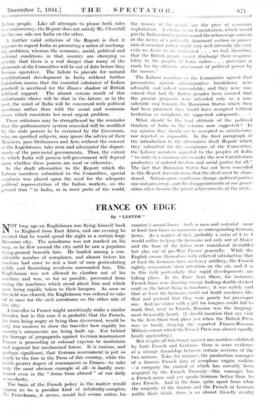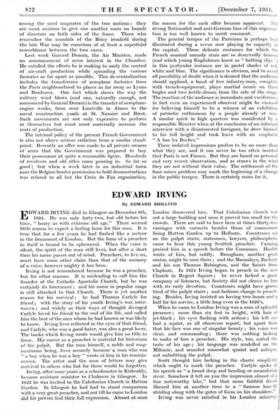FRANCE ON EDGE
By "LESTOR " AT OT long ago an Englishman was flying himself back to England from East Africa,,and one evening he decided that he would spend the night in a certain large Bavarian city: The aerodrome was not marked on his map, so he flew around the city until he saw a populous flying-ground beneath him. He landed among a con- siderable number of aeroplanes, and almost before his machine had come to rest a host of men gesticulating wildly and flourishing revolvers surrounded him. • The Englishman was not allowed to clamber out of his machine and was, as far as possible, prevented from seeing the machines which stood about him,and which were being rapidly taken to their hangars.. As soon as the field was cleared, the Englishman was ordered to take off at once for the civil aerodrome on the- other side of the city.- A traveller in France might unwittingly.make a similar blunder, but in this case it is probable that the French, far from being angry at being thus discovered, mould be only too .anxious to show the traveller how rapidly his country's armaments are being built up. For behind the barrage of propaganda against German.rearmament France is.. proceeding at colossal expense. to .modernize and augment her mechanized forces. It is curious, and perhaps significant, that German rearmament is put so much to the fore in the Press of this country, while the much greater degree of rearmament in France—to take only the most obvious • example • of all—is, hardly -men- tioned even in the " items from abroad " of our daily news-sheets, , • - • • • • • The ba,sis..of, the-French policy in-the matter. would appear, to,.he peculiar kind of, inferiority-complex. No Frencllmgni,,it seems,..would feel. secure, unless. his country's armed forces----both in men and material—were at least four times as numerous as corresponding German items. As a matter of fact, probably a ratio of 2 to 1 would suffice to keep the Germans not only out of Alsace and the Saar (if the latter were considered desirable)' but also out of pre-War France generally. While the English assure themselves with relieved satisfaction that at least the Germans have no heavy artillery, the French rightly concentrate their attention on the air, and it is in this field particularly that. rapid developments are taking place. In the Paris Acro- Show, for instance, French firms were showing strange looking double-decked craft as the latest thing in bombers ; it was widely said that at least the Germans could not build machines like that and pretend that they were purely for passenger use. And no visitor with a gift for tongues could fail to mark that, next to French, Russian was the languag,, most frequently heard. (I should mention that my visit to the Acro Show took place just when the British Press was so. busily denying the reported Franco-Russian Military entente which the French Press was almost equally busily applauding.) But despite all this frenzy against one another exhibited by both French and Germans, there is some evidence of a strange friendship between certain sections of the. two nations. .Take, for instance, the production manager of .a famous French firm of aeroplane engine makers, —a company the control of which has, recently been acquired by the French Treasury—this manager has a French name and yet speaks German better than be. does French. And in the Saar, quite apart from what the majority of the Saarois and the French or German publie there think, there . is an almost . friendly rivalry among the steel magnates of the two nations : they are most anxious to give one another seats on boards of directors on both sides of the fence. Those who remember the scandals of the Bricy ironfield during the late War may be conscious of at least a superficial resemblance between the two cases.
Last week General Denain, the Air Minister, made an announcement of some interest in the Chamber. He extolled the efforts he is marking to unify the control of air-craft production while spreading the various factories as far apart as possible. This de-centralization includes the transference of aeroplane factories from the Paris neighbourhood to places as far away as Lyons and Bordeaux. One fact which, shows the way the military wind blows (and one, naturally enough, not announced by General Denain) is the transfer of aeroplane- .engine works, from near Luneville in Alsace to the naval construction yards—at--. St. .Nazaire and Brest. Such movements are not only expensive to perform in themselves but must most materially increase the costs of production.
The internal policy of the present French Government is also not above serious criticism from a similar stand- point. Recently an offer was made to all private owners of arms -that the Government was prepared to buy their possessions at quite a reasonable figure. Hundreds of revolvers and .old rifles came pouring in. So far _so good ; but when a week. later in an industrial town "'ear the Belgian border permission to hold demonstrations was refused to all but the Croix de Feu organization, the reason for the cash offer became apparent. The strong Nationalist and anti-German bias of this ,organiza. tion is too well known to merit comment; The general temper of the Parisians is perhaps best illustrated during a revue now playing to capacity in the capital. Those delicate costumes for which the French musical comedy stars are so deservedly famous (and which young Englishmen know as " bathing slips ") in this. particular instance are in pastel shades of red, white and blue. The significance is obvious, and to avoid all possibility of doubt when it is desired that the audience should applaud, a band .of five infantry-men, complete with trench-equipment, plays martial music on three bugles and two kettle-drums from the side of the stage. The reaction of the audience is immediate and vociferous ; in fact even an experienced observer might be excused for believing himself to be a witness of an exhibition of patriotic .enthusiasm by a people already at war. A similar spirit in high quarters was manifested by a responsible Minister when at the conclusion of an informal interview with a disinterested foreigner, he drew himself to his full height and took leave with an emphatic " A bas les Boches."
These isolated impressions profess to be no more than what they are, and it can never be too often insisted that Paris is not France. But they are based on personal and very recent observation, and as straws in the wind they are not without their value. The settlement of the Saar mines problem may mark the beginning of a change in the public temper. There is certainly room for it.



















































 Previous page
Previous page